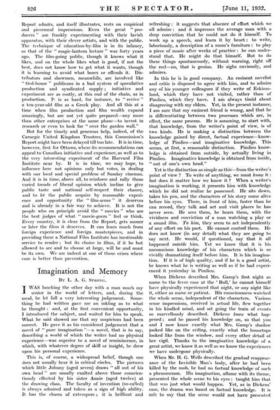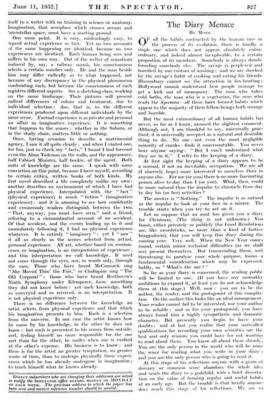Imagination and Memory
BY L. A. G. STRONG.
T WAS lunching the other day with a man much my -I- senior in the world of letters, and, during the meal, he let fall a very interesting judgement. Some- thing he had written gave me an inkling as to what he thought : and, at the first convenient opportunity, I introduced the subject, and waited for him to speak. What he said showed me that my suspicions had been correct. He gave it as his considered judgement that a novel of "pure imagination "—a novel, that is to say, describing a world of which the writer had no physical experience—was superior to a novel of reminiscence, in which, with whatever degree of skill or insight, he drew upon his personal experience.
This is, of course, a widespread belief, though one does not usually hear it in critical circles. The pictures which little Johnny (aged seven) draws "all out of his own head" are usually exalted above those conscien- tiously effected by his sister Annie (aged twelve) at the drawing class. The faculty of invention (so-called) is always admired and taken as a sign of high ability. It has the charm of extempore it is brilliant and refreshing : it suggests that absence of effort which we all admire : and it impresses the average man with a deep conviction that he could not do it himself. To work up a speech, and learn it by heart : to write, laboriously, a description of a room's furniture : to play a piece of music after weeks of practice : he can under- stand that. He might do that himself. But to do these things spontaneously, without warning, right off the reel—no, that is genius. He sighs enviously, and admires.
In this he is in good company. An eminent novelist and critic is disposed to agree with him, and to admire any of his younger colleagues if they write of Eskimo- land, which they have not visited, rather than of Pimlico, which they have. I am always timid about disagreeing with my elders. Yet, in the present instance, I am sure that my eminent friend is wrong, and that he is differentiating between two processes which' are, in effect, the same process. He is assuming, to start with, that knowledge, from the writer's point of view, is of two kinds. He is making a distinction between the knowledge gained by direct, factual experience—know- ledge of Pimlico—and imaginative knowledge. This seems, at first, a reasonable distinction. Pimlico know- ledge is obtained from outside, by actually living in Pimlico. Imaginative knowledge is obtained from inside, "out of one's own head."
Yet is the-distinction as simple as this—from the writer's point of view? To write of anything, we must know it : but does it matter how we know it ? When a writer's imagination is working, it presents him with knowledge which he did not realize he possessed. He sits down, takes his pen, and the characters of his story come alive before Ids eyes. There, in front of him, faster than he can record, they talk and act and visit places he has never seen. He sees them, he hears them, with the vividness and conviction of a man watching a play or a sound film. To him, they seem to act independently of any effort on his part. He cannot control them. He does not know (in any detail) what they are going to say next. He would, if questioned, say that it all happened outside him. Yet we know that it is his unconscious knowledge of his characters which is so vividly dramatizing itself before him. It is his imagina- tion. If it is of high quality, and if he is a good artist, he knows what he is writing as well as if he had experi- enced it yesterday in Pimlico.
When Dickens described Mrs. Gamp's first night as nurse to the fever case at the Bull,' he cannot himself have physically experienced that night, or any night like it, either as nurse or patient. His consciousness watched the whole scene, independent of the characters. Various sense impressions, received in actual life, flew together in his kindled mind, and set going the train of events so marvellously described. Dickens knew what hap- pened; and he passed his knowledge on, so that you and I now know exactly what Mrs. Garnp's shadow looked like on the ceiling, exactly what the housetops looked like from the window, and every other detail of her vigil. Thanks to the imaginative knowledge of a great artist, we know it as well as we know the experiences we have undergone physically.
When Mr. II. G. Wells described the gradual reappear- ance of the Invisible Man's body, after he had been killed by the mob, he had no factual knowledge of such a phenomenon. His imagination, aflame with its theme, presented the whole scene to his eyes : taught him that that was just what would happen. Yet, as in Dickens' case, the drama was based on factual knowledge. It is safe to say that the scene would not have presented
itself to a writer with no training in science or anatomy. Imagination, that aeroplane which crosses oceans and 'nterstellar space, must have a starting ground.
One more point. It is easy, misleadingly easy, to regard actual experience as fact. Yet no two accounts of the same happening are identical, because no two experiences are identical. Each human being sees and suffers in his own way. Out of the welter of sensations induced by, say, a railway smash, his consciousness selects a certain number only. He and the man beside him may differ radically as to what happened, not because of any discrepancy in the physical phenomena confronting each, but because the consciousness of each registers different aspects. See a sketching class, working on the same landscape. Their pictures will present radical differences of colour and treatment, due to individual selection: due, that is, to the different experiences produced upon different individuals by the same scene. Factual experience is as private and personal an affair as imaginative experience. It is something that happens to the senses : . whether in the Sahara, or in the study chair, matters little or nothing.
Once, having occasion to describe a matrimonial agency, I. saw it all quite clearly : and when I visited one, for fun, just to check my "facts," I found I had forecast even the Alma Tademas on the walls, and the appearance, half Cabinet Minister, half bookie, of the agent. Both sorts of knowledge are the same. I speak with some conviction on this point, because I have myself, according to certain critics,. written books of both kinds. My first novel described a life completely unlike my own : another describes an environment of which I have had physical experience. Interpolated with the " fact " (physical experience) is much " fiction " (imaginative experience) : and it is amusing to see how confidently and erroneously readers distinguish between the two. "That, anyway, you must have seen," said a friend, referring to .a circumstantial account of an accident. Of that accident, and the events leading up to it and immediately following it, I had no physical experience whatever. It is entirely " imaginary " : yet I " saw " it all as clearly as the scenes selected from actual, personal experience. All art, whether based on reminis- cence or imagination, is an interpretation of experience : and this interpretation we call knowledge. It need pot come through the eyes, nor, in words only, through the ears. Those who have heard McCormack sing "She Moved Tbro' the Fair," or Chaliapine sing "The Old Corporal " : those who have heard Beethoven's Ninth Symphony under Klemperer, know something they did not know before :• yet such knowledge, both as conveyed and as received, is an interpretation. It is not physical experience only.
There is no difference between the knowledge an artist selects from physical experience and that which his imagination presents to him. Each is a selection from the universe. In one case the artist knows how he came by his knowledge, in the other he does not know : but each is presented to his senses from outside, and, feeling himself no more responsible for the one sort than for the other, he smiles when one is exalted at the Other's expenSe. His business is to know : and there is for the artist no greater temptation, no greater waste of time, than to undergo physically those experi- ences which he has already undergone in imagination ; to teach himself what he knows already.



































 Previous page
Previous page